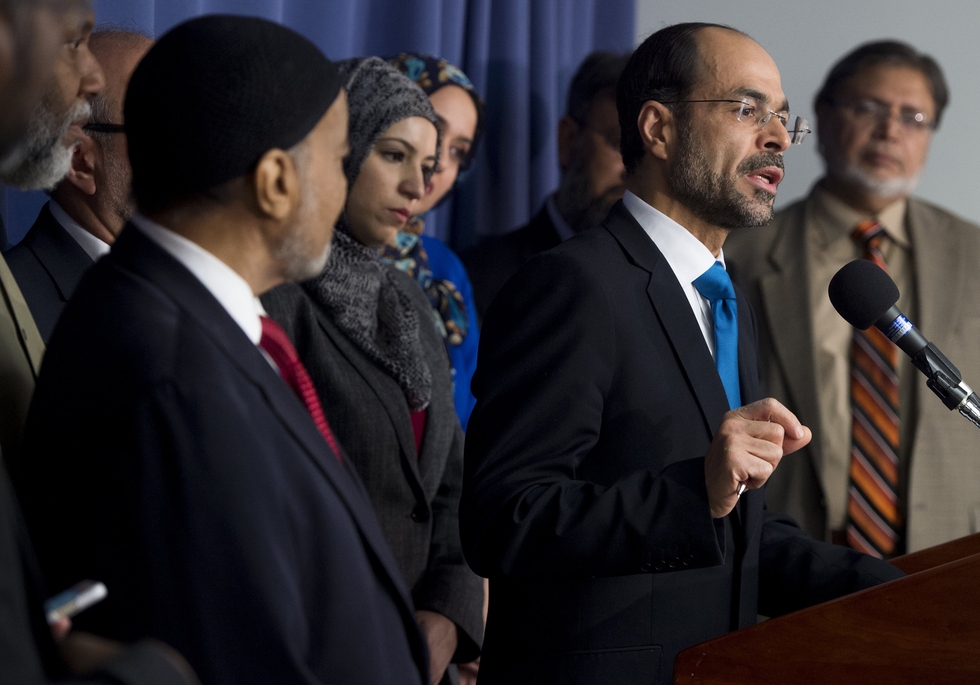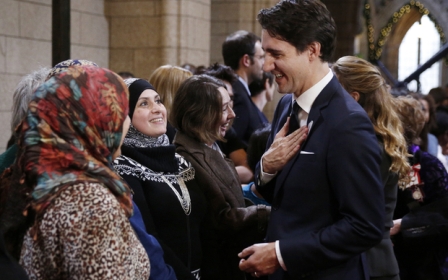Muslim-Americans file class-action lawsuit against terror watch list

TORONTO, Canada – A group of Muslim-Americans filed a class-action lawsuit against the United States’ use of a terrorist watch list, which they say has created “an injustice of historic proportions”.
Eighteen plaintiffs, including a four-year-old known simply as Baby Doe, say their constitution rights were violated after being placed on the federal terrorist watch list.
The lawsuit, initiated by the Council on American-Islamic Relations’ Michigan Chapter (CAIR-MI), was filed against several high-ranking US officials, including Christopher Piehota, director of the Terrorist Screening Center (TSC).
Established in 2003 under the administration of the FBI, the TSC maintains the Terrorist Screening Database, otherwise known as the terrorist watch list.
The plaintiffs, all of whom are American citizens, have been “falsely stigmatised as ‘known or suspected’ terrorists” and “denied a meaningful opportunity to challenge their designation on the federal watch list,” the lawsuit states.
Gadeir Abbas, a lawyer for the plaintiffs, told Middle East Eye that being on the watch list has turned thousands of Americans into second-class citizens.
Individuals on the list have had their bank accounts closed without warning, been denied the ability to make wire transfers, suffer delays and interrogations at airports and other border crossings, and cannot work certain jobs, Abbas said.
The US government also disseminates its watch list to state and local agencies, including police and security forces, both in the US and abroad, he said.
“Being on the federal watch list [creates] second-class citizenship status because not only are you unable to live your life as other innocent Americans are, but you’re unable to travel internationally without substantial risks to your life and liberty,” Abbas said.
“The federal government is saying to countries all across the globe that these innocent Americans … are dangerous, are known or suspected terrorists, when they are no such thing.”
Broad authority
The FBI does not comment on pending litigation, TSC spokesman Dave Joly told Middle East Eye in an email, when asked to comment on the lawsuit.
The TSC does not publicly confirm nor deny whether an individual may be included on the terrorist watch list or a subset list, Joly said.
“Disclosure of an individual's inclusion or non-inclusion in the TSDB or on the No Fly List would significantly impair the government's ability to investigate and counteract terrorism, and protect transportation security,” he said.
The TSC “serves as a bridge between law enforcement, Homeland Security, the Intelligence Community, and international partners,” the department says on its website.
The centre also states that individuals cannot be placed on the list “based solely on race, ethnicity, national origin, religious affiliation, or First Amendment-protected activities”.
But an article published by The Intercept in 2014 showed that neither “concrete facts” nor “irrefutable evidence” are necessary to apply the terrorist label to an American or foreign citizen.
New TSC rules outlined in a March 2013 document obtained by The Intercept “allow individuals to be designated as representatives of terror organisations without any evidence they are actually connected to such organisations, and it gives a single White House official the unilateral authority to place entire ‘categories’ of people the government is tracking onto the no-fly and selectee lists”.
“It broadens the authority of government officials to ‘nominate’ people to the watchlists based on what is vaguely described as ‘fragmentary information'. It also allows for dead people to be watchlisted,” The Intercept reported.
1.5 million nominations to list since 2009
The CAIR-MI lawsuit alleges that more than 1.5 million names have been nominated to the watch list since 2009 and that 99 percent of the nominations made in 2013 were turned into permanent placements on the list.
The US terrorist watch list has two components: persons on the selectee list undergo extra security screenings at airports and other crossings, and may find “SSSS” marked on their boarding passes, which indicates their status on the list.
Individuals on the no-fly list, meanwhile, cannot board flights into, out of, or even through US airspace.
According to the American Civil Liberties Union (ACLU), the terrorist watch list currently has over a million names on it.
Having a “bloated” list increases the likelihood of mistaking innocent travellers for suspected terrorists, wastes time and diverts energy away from identifying real threats, the ACLU said.
“Federal, state, and local authorities are engaging in discriminatory profiling on a broad scale in the name of national security,” the group said, including subjecting minorities to additional screening at airports and other border crossings.
Violating the Constitution
CAIR-MI also filed a second lawsuit this week, asking a US judge to issue a declaration that the plaintiff’s Fifth Amendment rights had been violated by being on the terrorist watch list.
The complaint also asks for an injunction to remedy any civil rights violations, including providing steps to remove individuals’ names from the list, a legal avenue to know why they are on the list and a mechanism to contest that placement.
“It’s as if the government stole your car and is refusing to tell you that it is they that stole it from you,” said Abbas, about how the government places people on the selectee list without explanation.
“At the very least, the federal government needs to provide people with notice that they’ve been placed on the selectee list, either after or before that placement occurs. The fact that they have not done so is the clearest indication that they’re operating the selectee list in a way that clearly violates the Constitution.”
According to CAIR-MI Legal Director Lena Masri, thousands upon thousands of American Muslims have been wrongfully designated as known or suspected terrorists without due process.
Dearborn, Michigan, a city of about 100,000 residents of which 40 percent is Arab, is among the top five cities represented on the watch list, the lawsuit also found. The others are Chicago, Houston, New York and San Diego.
“The terrorism watch lists are premised on the false notion that the government can somehow accurately predict whether an innocent American citizen will commit a crime in the future based on religious affiliation or First Amendment activities," Masri said in a statement.
Syrian-Canadian takes on Canada’s use of US no-fly list
The US no-fly list also has ramifications for foreign citizens. A Syrian-Canadian man, for example, will have a discrimination case related to the US no-fly list heard by the Canadian Human Rights Tribunal later this year.
The man, whose name has not been made public, was denied boarding on an Air Canada flight in 2011 after he said he was told that his name appears on the US no-fly list. The man was flying with his family between London, Ontario, and Vancouver, with a stop in Toronto.
“Airlines, and in particular Air Canada, have been quite cavalier in how they’ve used these lists. They hide behind the secrecy of these regimes,” the man’s lawyer, Paul Champ, told Middle East Eye.
“I think we’re going to see more information revealed and made public about how these listing regimes work and how the airlines implement them, or deal with them, than we’ve ever really seen in Canada.”
Champ said at least 2,000 people are currently on the Canadian no-fly list, known as the Passenger Protect Program. But Canadians on the US no-fly list also face problems in Canada. The issue received widespread media attention in Canada late last year when a six-year-old boy was stopped on his way to Boston to watch a hockey game with his father. His father saw the letters “DHP” – Designated High Profile – on a check-in screen at the airport, which means he is on a no-fly list.
Champ said he hopes the tribunal will rule that it’s illegal for Air Canada to apply the US no-fly list on domestic Canadian flights and declare that the US no-fly list engages in racial profiling by disproportionately targeting Muslims and Arabs.
“The problem with these listing regimes is that they are used very loosely. The criteria that they use to place people on these lists aren’t tested. There’s no evidence whatsoever that they’re effective,” he added.
‘Infatuation with watch-listing innocent people’
While Abbas said he was pessimistic this week’s lawsuits would change how the US watch lists are used against foreign citizens, he told Middle East Eye that the country’s “infatuation with watch-listing innocent people is contagious”.
“The US often takes counter-terrorism actions that impose an injustice on everybody across the world,” he said.
He said the fact that many of the plaintiffs have come forward using their real names and have been willing to speak about their experiences is the first step in changing the watch-listing system.
“The more people are willing to speak out against the federal watch list, the more the American public is going to realise that it’s innocent college students, people that could be their sons, their nephews, their daughters, peoples’ fathers, business owners that people rely upon,” Abbas said.
“Those are the people that are on these watch lists, not the people that want to do us harm.”
Middle East Eye propose une couverture et une analyse indépendantes et incomparables du Moyen-Orient, de l’Afrique du Nord et d’autres régions du monde. Pour en savoir plus sur la reprise de ce contenu et les frais qui s’appliquent, veuillez remplir ce formulaire [en anglais]. Pour en savoir plus sur MEE, cliquez ici [en anglais].



